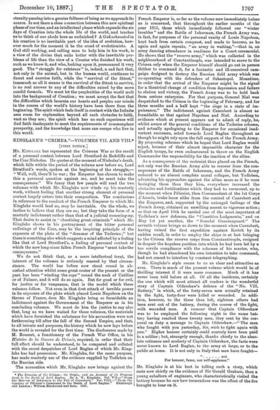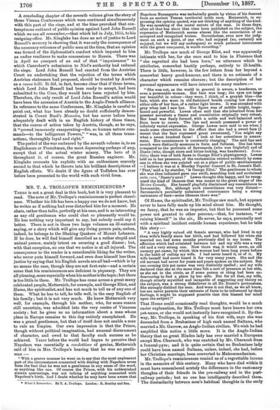KINGLAKE'S "CRIMEA."—VOLUMES VII. AND VIII.*
[FIRST NOTICE.]
Mn. KINGLANE has represented the Crimean War as the result of a personal contest between Lord Stratford de Radcliffe and the Czar Nicholas. He quotes at the moment of Nicholas's death, which falls within the period of the volume now before us, Lord Stratford'e words, spoken at the beginning of the straggle,— " Well, well, there'll be war ; the Emperor has chosen to make this a personal question against me, and he must take the consequences." We fancy that few people will read the two volumes with which Mr. Kinglake now winds op his masterly work, without feeling that another strong element of personal contest largely enters into their composition. The conclusions in reference to the conduct of the French Emperor to which Mr. Kinglake would lead us, may be inevitable. On the whole, we incline to believe that they are so; but they take the form of a masterly indictment rather than that of a judicial samming-up. That desire to assist in "chastising great criminals" which Mr. Kinglake shows in his portrayment of the bitter personal sufferings of the Czar, may be the inspiring principle of the exposure of the plots of the "dreamer of the Tuileries ;" but there is something also which suggests a mind affected by a feeling like that of Lord Stratford's, a feeling of personal contest of which the now long-since fallen French Emperor "must takethe consequences."
We do not think that, as a mere intellectual treat, the interest of the volumes is seriously marred by that circum- stance. The world has before now stood round in ab- sorbed attention whilst some great orator of the present or the past has been "winding the rope" round the neck of Catiline or of Palmer, and it will do so again. But for good or for evil, for justice or for vengeance, that is the model which these volumes follow. Not even in that first attack of terrible power in its exposure of the plots which placed Louis Napoleon on the throne of France, does Mr. Kinglake bring so formidable an indictment against the Government of the Emperor as in his concluding volumes. We must do him the justice to say also that, long as we have waited for these volumes, the materials which have famished the substance for his accusation were not forthcoming till after the fall of the Second Empire, and that, to all intents and purposes, the history which he now lays before the world is revealed for the first time. The disclosures made by M. Rousset, a functionary of the French War Office, in his Histeire de la Guerra de CriinSe, required, in order that their
full effect should be understood, to be compared and collated with the secret despatches of Lord Raglan of which Mr. King- lake has had possession. Mr. Kinglake, for the same purpose, has made masterly use of the evidence supplied by Todleben on the Russian side.
The accusation which Mr. Kinglake now brings against the
The Invasion of the Crimea; it, Origin, and an- Account of its Progress down to the Death of Lord Raglan. By A. W. Rumba°. Vol. VII.—" From the Morrow of Inkermen to the Fell of Canrobert." Vol. VIII.—" From the Opening of Palmier's Command to the Death of Lord Raglan." Edinburgh and Londont William Blackwood and Bons. 1887. French Emperor is, so far as the volume now immediately before us is concerned, that throughout the earlier months of the year 1855, those which immediately followed our "winter troubles" and the Battle of Inkerman, the French Army was, in fact, for purposes of the personal vanity of Louis Napoleon, kept back from certain conquest, and made to become, as he again and again repeats, "an army in waiting,"—that is, an army dancing attendance in readiness for a Court ceremonial. He shows that the "reserve army," which was collected in the neighbourhood of Constantinople, was intended to move to the Crimea only when the Emperor himself should go out in person thither to command it, for a fantastic and ill-conceived cam- paign designed to destroy the Russian field army which was co-operating with the defenders of Sebastopol. Meantime, in order that the arrival of the Emperor might be the signal for a theatrical change of condition from depression and failure to elation and victory, the French Army was to be held back from serious enterprise. For that purpose, General Niel was despatched to the Crimea in the beginning of February, and for three months and a half kept "the siege in a state of im- puissance." The indictment against Canrobert is almost as formidable as that against Napoleon and Niel. According to evidence which at present appears not to admit of reply, he, whilst aware of the general conditions of the Tuileries scheme, and actually apologising to the Emperor for occasional inad- vertent successes, acted towards Lord Raglan throughout as though he might rely upon the full support of the French Army. By proposing schemes which he hoped that Lord Raglan would reject, because of their almost impossible character for the English troops, he even endeavoured to throw on the English Commander the responsibility for the inaction of the allies.
As a consequence of the restraint thus placed on the French, not only was the Russian Army able to recover from the con, sequences of the Battle of Iukerman, and the French Army reduced to an almost complete moral collapse, but Todleben, advancing his approaches against the allies more as if he were besieging them than they him, everywhere increased the obstacles and fortifications which they had to surmount, up to the moment when Pelissier, then Commandant of the 1st Corps d'Arm4e, broke loose alike from the control of Canrobert and the Emperor, and, supported by the outraged feelings of the French Army, obtained an unwilling assent to vigorous action; so that on April 10th he carried one of the most important of Todleben's new defences, the " Cimetiohe Lodgments," and on May 1st yet another, the " Sousdal Conuterguard." The seventh volume brings us down to the moment when Canrobert, having ruined the first expedition against Kertch by its sudden recall, in order to employ the ships in at last bringing to the Crimea the reserve corps from Constantinople, resigned in despair the hopeless position into which he had been led.by a too servile compliance with the schemes of his master, who, though he had abandoned his own intention to take command, had not ceased to interfere by constant telegraphing.
Mr. Kinglake's style seems to us as clear and attractive as ever. There is much of the present volume which would be of thrilling interest if it were mere romance. Much of it has never been told before at all. Of all the incidents, certainly the one which will most attract all readers is the wonderful story of Captain Oldershaw's defence of the "No. VII. Battery," in which, of the forty-seven men actually retained in the fight, forty-four were killed or wounded. In addi- tion, however, to the three thus left, eighteen others had been sent out of the battery, during the course of the fight, with wounded men. A rumour that Captain Oldershaw was to be employed the following night in the same bat,. tery having reached these twenty men, they sent by the con. poral on duty a message to Captain Oldershaw,—" The men who fought with you yesterday, Sir, wish to fight again with you." Higher honour certainly could scarcely have been paid to a soldier ; bat, strangely enough, thanks chiefly to the abso- lute reticence and modesty of Captain Oldershaw, the facts were never known to Lord Raglan, to the army at large, or to the public at home. It is not only in Italy that men have fought—.
not
For honour, fame, nor eelf-applause."
Mr. Kinglake is at his best in telling each a story, which rests now chiefly on the evidence of Sir Gerald Graham, then a young subaltern of engineers, who characteristically visited the battery because he saw how tremendous was the effect of the fire brought to bear on it.
A concluding chapter of the seventh volume gives the story of those Vienna Conferences which were continued simultaneously with this part of the siege, and at the time provoked that con- temptuous outburst of public opinion against Lord John Russell which we can all remember,—that which led in July,1855, to his resigning office. Mr. Kinglake has done an act of justice to Lord Russell's memory in showing that it was only the consequence of the necessary reticence of public men at the time, that an opinion was formed of the diplomatist's conduct which imputed to him an undue readiness to make concessions to Russia. There was in April no prospect of an end of that "impuissance" to which Canrobert's submission to Niel's authority had reduced the siege. Lord John Russell had exacted from the Austrian Court an undertaking that the rejection of the terms which Austrian statesmen had proposed, should be treated by Austria as a cants belli. It did, in fact, become clear that if these terms, which Lord John Russell had been ready to accept, had been submitted to the Czar, they would have been rejected by him. Therefore, the only result of Lord John Russell's action would have been the accession of Austria to the Anglo-French alliance. In reference to the same Conferences, Mr. Kinglake is careful to point out, what has been already no doubt sufficiently demon- strated in Count Buol's Memoirs, but has never before been adequately dealt with in an English history of these times, that the course of action taken by Austria, though, as he says, it "proved immensely exasperating—for, so human nature com- mands—to the belligerent Powers," "was, in all these trans- actions, thoroughly loyal and right."
The period of the war embraced by the seventh volume is, to an Englishman or Frenchman, the most depressing perhaps of any, except that of the actual winter misery. The hero of it throughout is, of course, the great Russian engineer. Mr. Kinglake recounts his exploits with an enthusiasm scarcely second to that which he throws into his brilliant descriptions of English efforts. We doubt if the figure of Todleben has ever before been presented to the world with such vivid force.























































 Previous page
Previous page